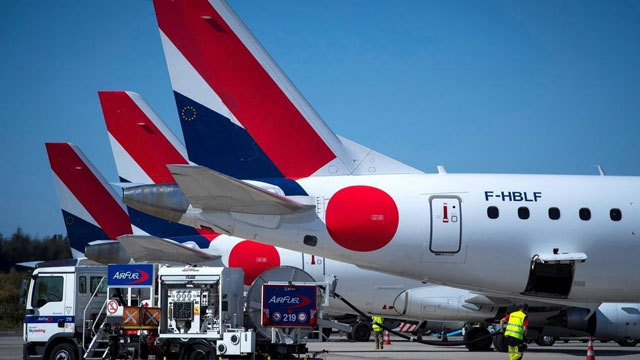
Paris, France | AFP | Airlines have taken steps to reduce their carbon footprints under the gaze of public opinion, but the pressure of the bottom line means some fly with extra fuel, boosting emissions of climate-changing greenhouse gases.
As the highly competitive air travel industry is being pushed to reduce its carbon emissions — which it puts at two to three percent of the global total — the practice known as fuel tankering has become an acid test for airlines’ commitment to really go green.
In fuel tankering, an aircraft’s tanks are filled sufficiently at the departure airport to avoid having to take on additional fuel for the return leg at a destination airport where fuel costs may be higher, or there are supply issues.
According to a study by Eurocontrol, the practice is a money-saving strategy for airlines as it outweighs the cost of additional fuel needed to carry the extra weight on the outbound flight.
“Aviation is a very competitive market and each airline needs to minimise operating costs, in order to keep its ticket prices as competitive as possible,” said the group, an inter-governmental organisation that helps harmonise regulations in the sector.
With fuel accounting for up to 25 percent of airlines’ operating expenses, “saving fuel has become a major challenge for aviation”, it added.
Eurocontrol found that in Europe fuel tankering concerns about one in six flights, on average resulting in an extra 136 kg of fuel burned.
Despite the additional fuel cost of 75 euros it still results in a net saving of 126 euros per flight. That saving also includes nine euros for purchasing carbon allowances for the 428kg of additional CO2 generated.
The report estimated that in Europe fuel tankering could generate net savings of 265 million euros per year for airlines, while adding 286,000 tonnes of fuel burnt and 901,000 tonnes of CO2 emissions.
“This represents about 2,800 round-trips between Paris and New York or the annual emissions of a European city of 100,000 inhabitants,” said the report.
– Everybody does it… –
After being called out for fuel tankering by the BBC, British Airways called it a “common practice across the airline industry” and said that it is done for “operational, safety and price reasons”.
British Airways said it resorts to fuel tankering for “mainly short-haul destinations where there are considerable fuel price differences between European airports”.
Willy Walsh, the head of IAG, British Airway’s parent company, acknowledged that the issue shows that airlines are torn between economic and environmental imperatives.
“What we see today is that there is often a conflict between what we do that makes a commercial and financial sense and the things we should be doing from an environmental point of view,” he told investors at a gathering at the beginning of November.
Germany’s Lufthansa said it resorts to fuel tankering only exceptionally for operational reasons because the practice “goes against our goal of reducing carbon emissions,” said a spokesman.
Air France said it practiced fuel tankering only on “some specific” routes for economic or organisational reasons.
– Offsets –
The airline industry adopted in 2016 a mechanism called CORSIA to offset any increase in CO2 emissions from 2020 levels using tree-planting and other schemes that absorb carbon.
This will allow the industry to continue to grow to meet rising demand for air travel without adding any additional carbon on a net basis.
Budget airline easyJet announced it plans to go further by offsetting emissions from all flights.
Most airlines have also undertaken efforts to reduce their emissions such as optimising flight paths, using electric towing vehicles or reducing the weight of seats.
But these efforts are not sufficient believes Andrew Murphy of the non-governmental organisation Transport and Environment.
“The increase of aviation emissions and stories like this show that actually the industry isn’t doing enough and actually we can’t just rely on the industry to cut it’s own emissions,” said Murphy.
“The equation is super complex” to arrive at a reduction of emissions when the volume of air traffic is expected to double every 15 to 20 years, said Pascal Fabre, an air travel expert at the consultancy Alix Partners.
The situation is even more daunting as airlines need to make money to survive, with around a dozen going out of business in the past year and a half according to the International Air Transport Association (IATA).
 The Independent Uganda: You get the Truth we Pay the Price
The Independent Uganda: You get the Truth we Pay the Price


